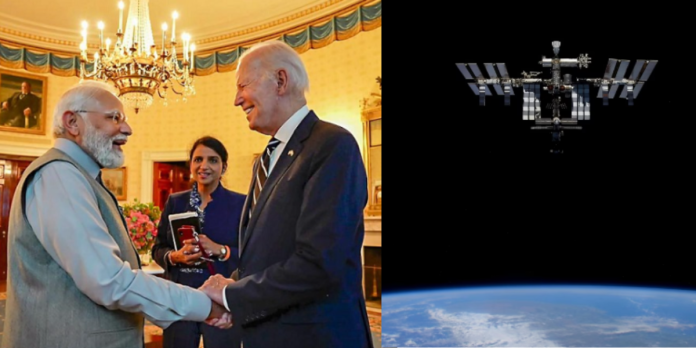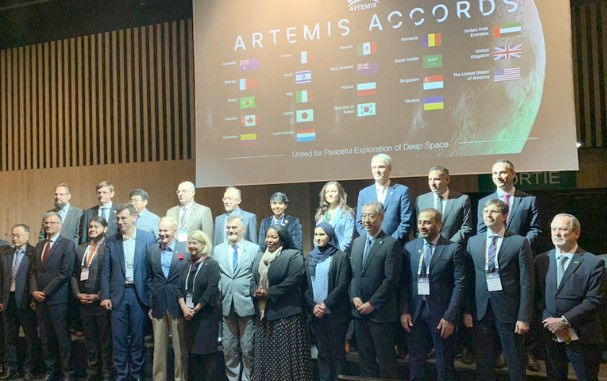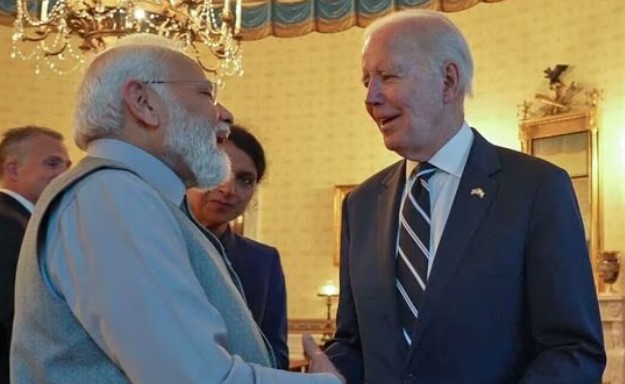
India Signs “Artemis Accords” And Embarks on Joint Space Mission With The US.
Date:

Share post:
Introduction
During Prime Minister Narendra Modi’s state visit to the United States, an important milestone was reached in space exploration and cooperation. On Thursday, the Prime Minister signed the Artemis Accords with the United States, signaling India’s commitment to global space collaboration. Additionally, the National Aeronautics and Space Administration (NASA) and the Indian Space Research Organisation (ISRO) have agreed to launch a joint mission to the International Space Station (ISS) in 2024. This article explores the significance of these developments and the potential implications for India’s space program.
Understanding the Artemis Accords
The Artemis Accords are a non-binding multilateral arrangement between the US government and other world governments participating in the Artemis program. This program aims to return humans to the Moon by 2025 and eventually expand space exploration to Mars and beyond. The accords, grounded in the United Nations Outer Space Treaty of 1967, establish a framework for cooperation in civil space exploration and use in the 21st century. As of June 22, 2023, 26 countries and one territory have signed the accords, demonstrating their commitment to the principles outlined within.
Principles and Guidelines for Lunar Missions
The Artemis Accords outline a set of principles and guidelines that participating countries are expected to follow during lunar missions. These principles include the peaceful exploration of space, transparency, interoperability, sustainable utilization of space resources, and preservation of historic sites and artifacts on the Moon. By signing the accords, India showcases its dedication to these principles and its readiness to collaborate with other nations in lunar exploration.

Significance for India
India’s decision to sign the Artemis Accords marks a significant step towards global space cooperation and participation in lunar missions. By joining the accords, India opens doors for collaboration with other nations, particularly the United States, in future Moon missions. This collaboration allows for the exchange of knowledge, expertise, and resources, advancing scientific research, technological development, and humanity’s presence in space.
Joint Mission to the ISS
In addition to signing the accords, NASA and ISRO have agreed to launch a joint mission to the International Space Station in 2024. This mission further solidifies the partnership between the two space agencies and provides an opportunity for India to contribute to the advancements in space exploration and scientific discoveries. By working together on the ISS, India and the United States can leverage each other’s strengths and enhance their respective space programs.

Other Collaborative Initiatives
During Prime Minister Modi’s state visit, various US companies have expressed interest in partnering with India to build a semiconductor ecosystem that promotes supply chain diversification. Micron Technology, supported by the Indian National Semiconductor Mission, has announced a substantial investment of over $800 million. This investment, combined with financial support from Indian authorities, will result in the establishment of a $2.75 billion semiconductor assembly and test facility in India. Such collaborations not only foster technological advancements but also contribute to the growth and development of the Indian economy.
Conclusion
India’s participation in the Artemis Accords and the joint mission to the ISS signifies a significant stride in its space exploration endeavors. By aligning with global space cooperation initiatives, India demonstrates its commitment to advancing scientific research and expanding humanity’s presence beyond Earth. These collaborations with the United States and other nations pave the way for shared knowledge, resource utilization, and technological advancements in space exploration. As India continues to make strides in the field of space, these initiatives position the country as an important player in the international space community.
Also Read: Dr. Vijayalakshmi Ramanan, the Trailblazing Woman IAF Officer and Lifesaving Doctor
